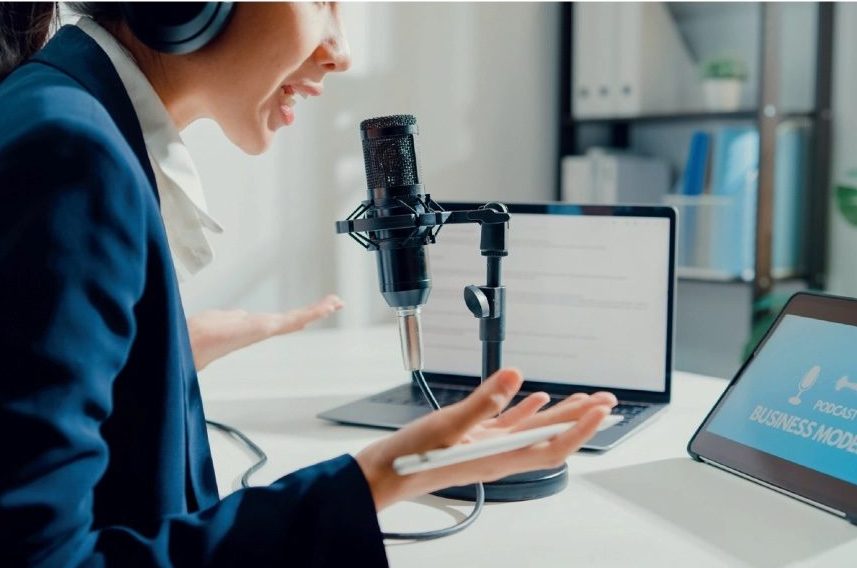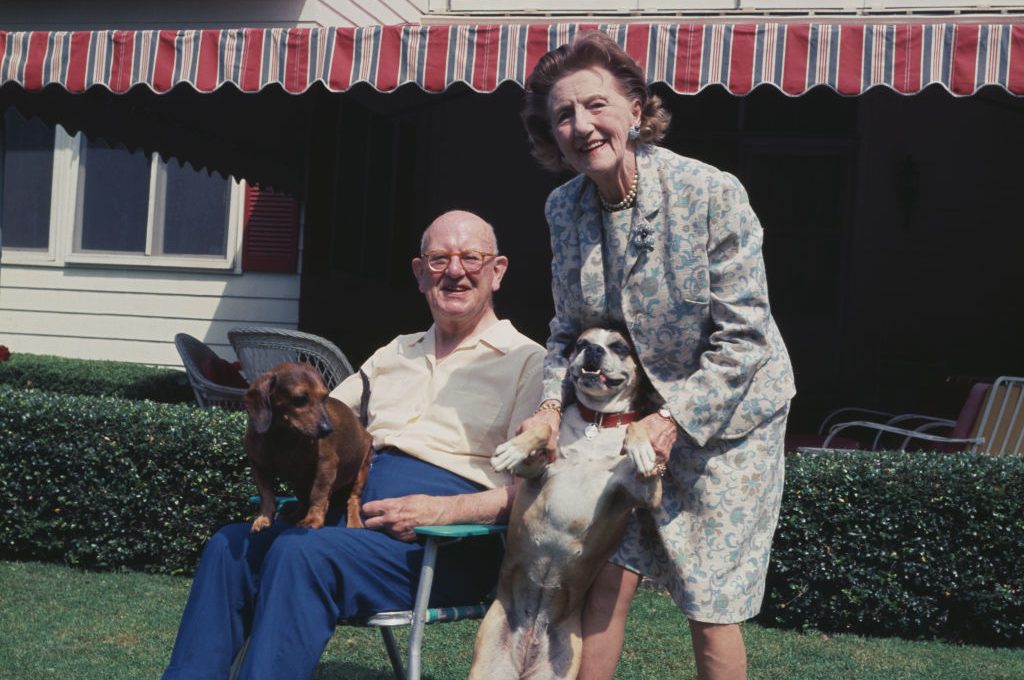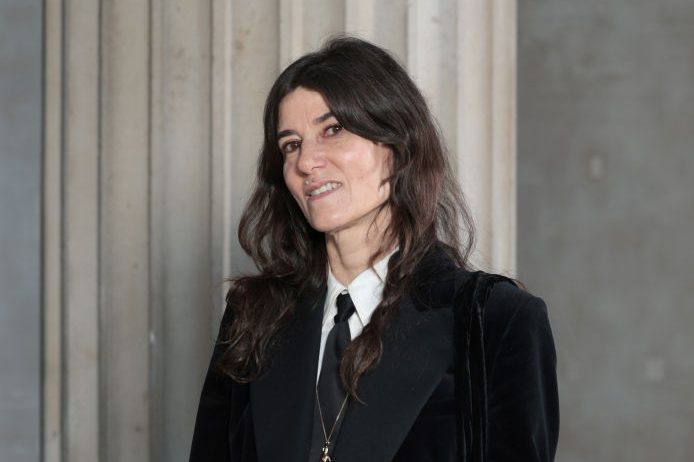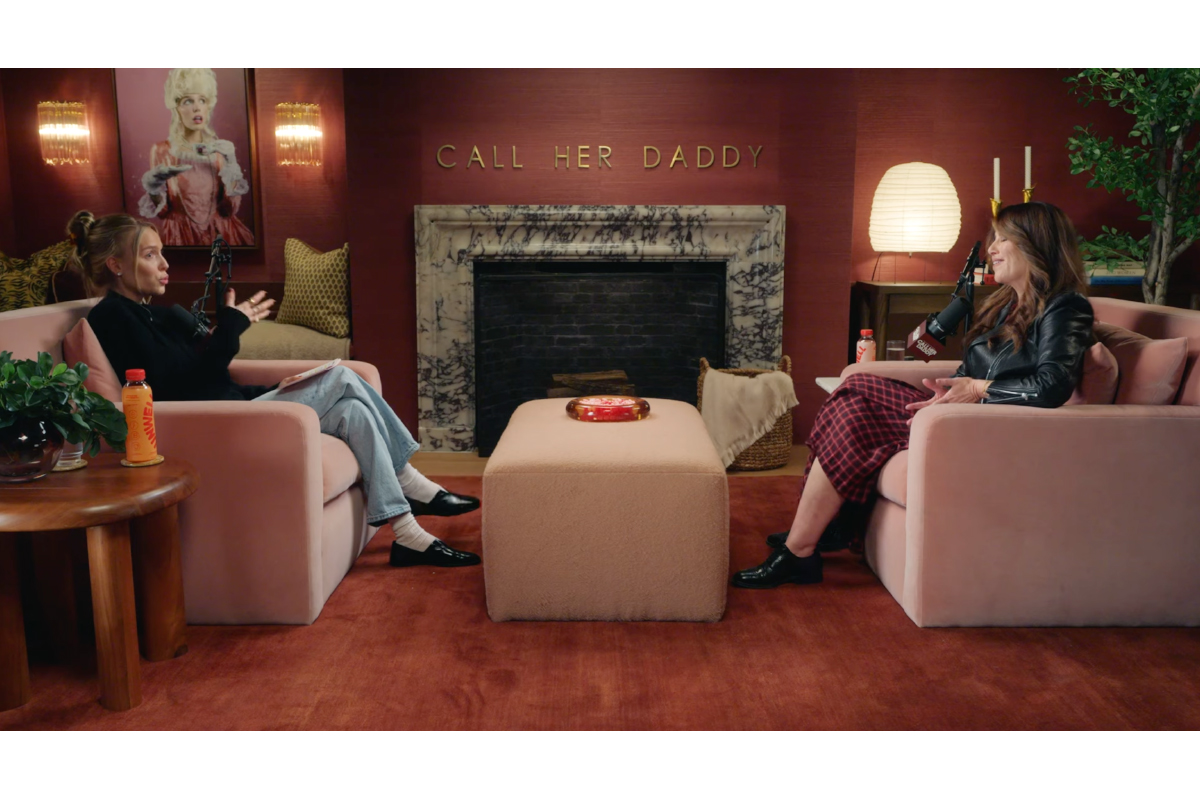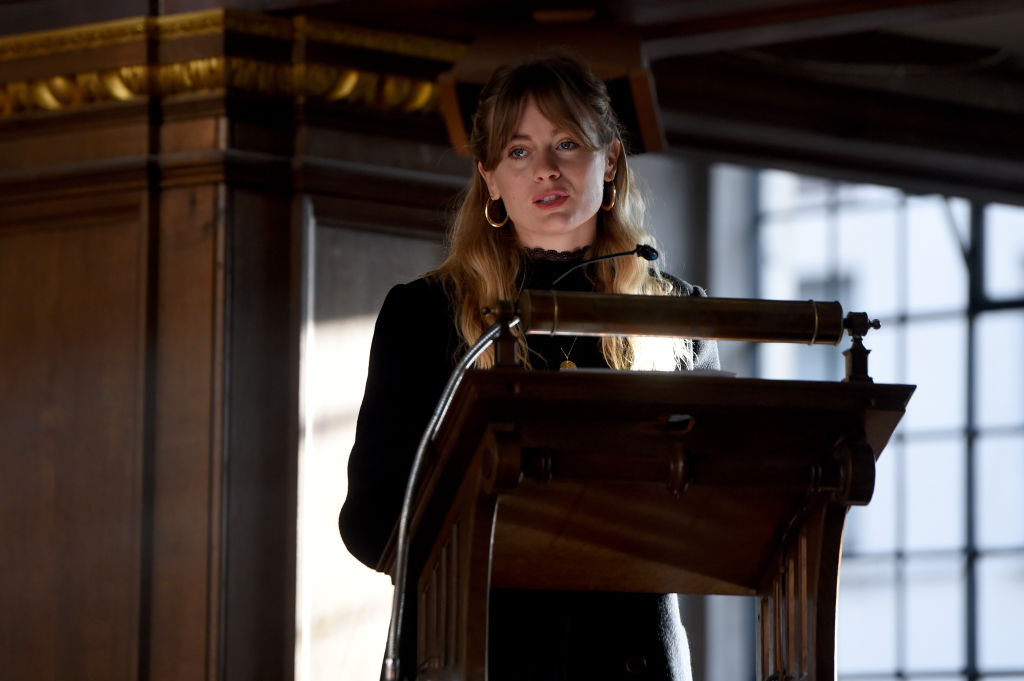A few months ago, a clip from a podcast went mildly viral online. A lightly dressed woman sits in front of a microphone, explaining her sex life in pedantic detail to an offscreen interviewer. It was strange and unpleasant, which was why people couldn’t stop looking at it. What kind of podcast is this, exactly? Who’s listening to it? The answer was nobody. The woman was a porn actress called Vicky Banxx, and the podcast didn’t exist.
Across the world, thousands of people are doing the same thing: plonking themselves down in front of mics, setting up a camera and talking in a genial, conversational style to absolutely no one. They give business tips or wellness advice or share embarrassing details about their lives in twenty-second fragments, that they pluck from a long, loose, free-form chat that didn’t actually take place. It’s a mass sustained illusion of conversation.
I get why they do this. If you’re being interviewed on a podcast, it means that at least one other person — a person with a podcast studio, no less — is interested in what you have to say, which means that the things you’re saying are plausibly interesting. (This might be why the single most boring person I’ve ever met spent nearly a year trying to get famous with her podcast.) The mic has a kind of magic function: it turns any ordinary idiot into a piece of the general discourse, even if you don’t actually turn it on. Maybe a few decades from now, the post-apocalyptic priests who govern the ruins of our cities will all wear holy scrap-metal mics around their necks.
The media’s chosen term for this phenomenon is “fake podcasts,” which is unfortunate. Not just boring and unimaginative: it misses something important about these ghostcasts. They’re not fake at all; this is the medium of podcasting in its purest form. All podcasts are fake. Because nobody actually listens to any of them.
People think they listen to podcasts. They like to talk about them; they act as if the podcasts you listen to are an important part of your identity. Sometimes people ask me which podcasts I listen to, and when I reply that these days I don’t really listen to any they react as if I’d said I don’t eat food or breathe air. How do you get through the day without your podcasts?
Every publication on the planet has to have an associated podcast. For a few months, a long time ago, I co-hosted the podcast for a little American literary magazine. You might have noticed me more recently on The Spectator’s. Some podcasters — including a few I know — started out recording their conversations for fun on laptop mics, and ended up pulling in millions a year. Everything conspires to make you think that these things meaningfully exist, and that people are listening to them. But they are not.
Years ago, I listened to a five-hour podcast on the Punic wars, replete with the details of armies, battles, the movements of peoples, the crises of states — and came away having mostly learned that there used to be a Carthage knocking around somewhere and now there isn’t. Every so often people get up in arms about Joe Rogan exposing his vast audience to various forms of misinformation; they needn’t bother. Everything he says evaporates as soon as you take off your headphones. Why would it stick? This is a conversation in which you’ll never be called upon to think up a reply. Instead, what you get is an education through vibes. You listen to history podcasts, not to learn about history, but to be the kind of person who’s listened to history podcasts.
People put on podcasts when they’re at work, or during their commute, or while they’re doing the dishes. When they’re drinking coffee, alone, in a shop full of strangers or glassy-eyed and immobile on the bus. It is the soundtrack to twenty-first-century loneliness: turn off your brain for a bit, fill it with other people’s chatter — a kind of foam insulation for the inside of your skull. Most of all, people stick on podcasts when they’re going to sleep. I used to do that too. Alone in bed, I’d listen to Democracy Now!: Amy Goodman’s deep, rich, slow, sandpapery voice lulling me unconscious with stories of famines and atrocities across the world. It feels good to hear a human voice whispering to you when you’re going to sleep. It makes you feel loved.
Podcasts are very effective friendship simulators. What they are not good at is conveying information. There’s a minor tribe online of go-getting wannabe entrepreneurs who appear to think that the most efficient way to learn anything is to listen to a podcast: why read a book when you could hear the author explain the whole thing in twenty minutes? Why waste time on the slow accretion of knowledge when you could multi-task, pouring information directly into your head via the ears, while the rest of your body is busy achieving its goals? These people know absolutely nothing about the world. Podcasting is, in Marshall McLuhan’s system, maybe the hottest of the hot media: it swamps your entire auditory field while bypassing any of the conscious integrative functions of the mind.
Podcasts are also, objectively, crap. I don’t say this lightly; this conclusion is the fruit of hours of research. One of the most popular podcasts in the world, making something in the region of $300,000 a month on the crowdfunding site Patreon, is something called True Crime Obsessed. Notionally, this is a crime-slash-comedy show. According to its hosts: “We recap your favorite true crime documentaries with humor, sass, and heart.” A fun, cheerful, lighthearted look at torture, murder, and rape. People who enjoy this kind of thing sometimes tell me that it’s actually not about the erotic, masochistic thrill of violence. They obsess over true crime because it helps keep them safe; they’re prudently making themselves aware of the dangers facing themselves and their children. I assume these people also religiously follow podcasts about the highway code.
But in fact, True Crime Obsessed is barely even about true crime; it’s just two of the planet’s most grating voices, babbling away. A representative exchange has one of the annoying voices looping through a reaction — “Can you imagine? Like can you imagine if, like, if that was your kid? Like, can you imagine?” — while the other voice occasionally interjects, firmly, “Yas.” Then they switch over. Every six minutes, they break their tales of brutal torture and death to gush over whatever product or service they’re being paid to advertise today. “Girl, Stitch Fix is back! Literally everything I’m wearing today was from Stitch Fix! It’s, it’s, it’s like your own personal stylist!”
Even more popular is a podcast called Maintenance Phase, which is notionally about debunking the myths of diet culture, but which is mostly more of the same, if a little slower: they ramble, they do back-and-forth banter, they make jokes that aren’t really funny, they laugh. The BBC seemingly has a tie-in podcast for every single one of its TV shows: Obsessed With Happy Valley, Obsessed With I May Destroy You, Obsessed with Antiques Roadshow, Obsessed With the News at Ten. In all of them, celebrity superfans ramble about nothing in particular and say things that aren’t funny and laugh. One of the top British podcasts on Spotify is called ShxtsNGigs, in which two best friends spend an hour each week doing the exact same thing in a different accent. “It can be raw,” the description warns. “It might be offensive but it’s always hilarious!” So I listened. “For me,” one of them said, “that kind of ting, it’s a lot.” “It’s a lot,” the other agreed. “It’s a lot,” the first one said. “Yeah,” said the other, “it’s a lot.”
Listening to podcasts — actually listening to them — is a deeply weird experience. Sometimes you might overhear a conversation in a pub and notice that, while everyone is constantly laughing, nothing remotely funny is being said. This is ordinary and fine. Most conversation is stupid and meaningless, but stupid meaningless conversation is one of the joys of friendship, and that phatic laughter when nothing remotely funny’s been said is part of what makes the whole thing work. Still, it only makes sense in the precise social context in which it actually happens. This is why the people in films and novels, even hyperrealist ones, don’t really talk like normal people. And, to be fair, the people on podcasts don’t talk like normal people either. Unlike the table of strangers at the pub, they know (or, mostly, hope) that they are being overheard by invisible strangers from the future. So they aggressively over-perform the act of chatting. A kind of patter that’s constantly looking over its shoulder, play-acting itself: a creepy facsimile; something bodiless pretending to be human.
Even the podcasts that are essentially just online radio shows — no fake banter, no gurning ad reads — seem to do something weird to people’s brains. A podcast is not like the radio: the radio consists of whatever happens to be on, at any particular moment, but a podcast is always unstuck in time. There is no one else listening with you; just you and the voices. This might be why the people who listen to podcasts are simultaneously totally disengaged and totally fanatical.
I noticed this right as the medium was getting off the ground. Serial, the first real prestige podcast, had managed to convince millions of people that a convicted murderer was actually innocent. I’d talk to people who were militant that Adnan Syed had not killed his ex-girlfriend, but they couldn’t really say why they knew this; they’d just got that sort of vibe from the show. (The American legal system can’t make up its mind either. In just the last year, Syed’s conviction has been vacated, reinstated, and stayed pending an appeal.) Today, there are people who base a considerable part of their self-identity on listening to Chapo Trap House or Red Scare, speaking in the tones they’ve absorbed through these shows, and it makes sense: you spend more time listening to these strangers talk than your actual friends.
The people who make podcasts usually have a very dim view of their public. I certainly did, during my brief stint chatting in front of nobody in particular. I couldn’t imagine the person who would actually like hearing my drivel, but they appeared to exist, and that was horrifying. My voice, saying nothing, as the soundtrack to someone’s life wasted doing nothing. Hard to imagine anything more bleak.
This article was originally published in The Spectator’s UK magazine. Subscribe to the World edition here.



